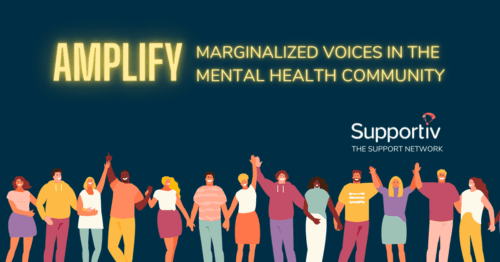New AMPLIFY Mental Health Resources Explore Racial And Ethnic Disparity, Neurodivergence, And More

In a new addition to its AMPLIFY article collection, Supportiv adds to its amplifying awareness of complex, marginalized mental health challenges while presenting fresh, first-person insights and challenges to mainstream conversations.
Supportiv Co-Founder & CEO Helena Plater-Zyberk explains why it’s so important to recognize the impact of marginalization on individual mental health:
“When your mental health experience is complex or less commonly discussed in mainstream conversations, those around you are much less likely to make you feel understood or validated–even if they’d like to. We work better together as humans when we have an idea of what others might be going through.”
Student writers from around the US delve into emotional struggles related to issues of identity and marginalized experience. Newly published titles in the AMPLIFY collection include:
Diagnosis Disparities Among Black Women | Ariel Montague
Of all the mental health burdens uniquely placed on Black women, diagnosis disparity due to medical racism should not be one.
Eco Anxiety, Climate Change, And BIPOC Mental Health | Madeleine Tremblay
For BIPOC, a number of factors compound eco anxiety or climate anxiety: environmental racism, political neglect, and mental health barriers.
Mixed Race Mental Health: Thinking In Brown And White | Sophie Reisbord
In an increasingly label-oriented world, what if you don’t fit neatly into any one label due to your mixed racial identity?
What Inclusivity Means To People With Disabilities | Sarah Kimak
How can people without disabilities understand and include people with disabilities? Disability inclusivity can often feel like a gray area.
The Alienation of LGBTQIA+ Within Indigenous Communities | Maleah Mays
Queer people face a lack of support and acceptance within Indigenous communities, which leads to unique mental health struggles.
Colorism-Based Social Status Damages Self-Image Among South Asians | Aditi Bhat
Colorism as an indicator of social status heavily impacts self-image, promoting insecurity and harming mental health.
How Our View of Autism Should Change in the Year 2022 | Fox Richards
Skewed ideas about autism–perpetuated by media–cause harm to both diagnosed and undiagnosed autistic people.
Covid’s Disproportionate Filipino-American Deaths: Grieving And Coping| Melissa Cabana
Filipino-Americans have seen more fatalities from covid than other ethnic groups, putting them more in need of grieving and coping resources.
Co-Founder Pouria Mojabi emphasizes the importance of these new additions to Supportiv’s AMPLIFY collection:
“Disability, neurodivergence, and racial and cultural context come together to leave a unique mark on individual mental health. While everyone’s experience is different, it’s important to amplify nuanced personal perspectives when we can–because someone out there is searching for someone who relates. Whether you’ve experienced these specific challenges or not, there’s something for everyone to learn from these resources.”
In addition to its peer-to-peer support network, relevant Supportiv articles and tips also surface in real-time inside its 24/7 peer support chats. By typing a few words in response to the question: “What’s your struggle?” users are matched in under a minute to topic-specific peer-to-peer group chats for anonymous support — from pandemic burnout to virus anxiety, from relationship drama to isolation, and from trauma to depression. Even experiences regarding objectification, culture, stigma, and shame are up for discussion in Supportiv’s anonymous peer support chats.
Read nuanced perspectives in the full collection at https://www.supportiv.com/amplify.
For more information on participating in the ongoing Amplify Writing Internship, visit https://www.supportiv.com/amplify-internship.
Contact Us
For anonymous peer-to-peer support, try a chat.
For organizations, use this form or email us at info@supportiv.com. Our team will be happy to assist you!

